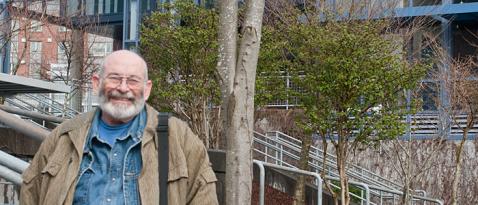James H. Williams: Social Work Pioneer
UW Tacoma lecturer James Williams was recently honored with the Jane Addams College of Social Work Pioneer Award.

Before becoming a lecturer in the Social Welfare program at the University of Washington Tacoma, James H. Williams was instrumental in melding mental health services and the legal system in two communities. For that work and his continuing efforts to teach others to do the same, he was recently honored with the Jane Addams College of Social Work Pioneer Award by his alma mater, the University of Illinois.
The award recognizes UI alumni who have made significant or pioneering contributions that have shaped or changed social conditions, practices or policies in social work.
“Dr. Williams has been an advocate for social reform and social change throughout his career,” said Creasie Hairston, dean of the Jane Addams College of Social Work.
In Savannah, Ga., three superior court judges nominated Williams for the award because of his significant contributions in developing an innovative collaboration between the criminal justice and behavioral health services systems. They were looking for better ways to adjudicate cases involving offenders with serious mental illness. At that time Williams was an associate professor at Savannah State University.
“Today we proudly call this collaboration the Chatham-Savannah Mental Health Court,” wrote the judges. “Over the past few years the program not only saved tax payers over half a million dollars, but has also greatly improved the quality of life of program participants.”
As supervisor of the Cook County (Illinois) Adult Probation Department’s Mental Health Unit earlier in his career, Williams was the first licensed clinical social worker in the unit.
“He worked tirelessly to mentor staff with the probation department using the core values of social work,” wrote a former colleague.
For people with mental illness, being charged with a crime is a confusing, overwhelming experience.
“Many of our clients encounter systemic as well as society barriers as result of a triple stigma of being felons, having a mental illness and being poor,” the colleague said in a nominating letter. “I witnessed Dr. Williams push these barriers in an effort to affect systemic changes in how the probation department worked with persons with severe mental illness.”
Williams said that, at the time, considering the prisoners’ mental illness was a pretty new idea. About 16 percent of prisoners have schizophrenia, severe depression or bi-polar disease. “If they had been properly treated, they probably wouldn’t have got into trouble,” Williams said.
“You look at the population and find out who committed an offense because of illness,” he explained. “Sometimes you can divert them from prison and fix them up with services in the community. If we can supervise people in the community, rather than in prison or a state hospital, it’s far less expensive and the outcomes are better.”
The Mental Health Court in Georgia was used to divert misdemeanors and felonies from the court system and work out a treatment plan for the offenders. It involved various stakeholders, including judges, prosecutors, defenders and social workers.
“The aim was to get people in treatment and make sure they stay there, not fall through the cracks,” Williams said. It took a year to get everyone together on the project, he said. Some were worried that the offenders would be coddled. But now the parties work together well, he added. The court has been running for three years.
Williams is a long-time volunteer with the National Alliance on Mental Illness, where he helps to train law enforcement officers how to work with mentally ill people.
At UW Tacoma, Williams teaches about mental health, substance abuse and prevention strategies in criminal justice.



